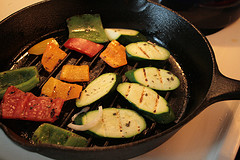Cast Iron Cookware Questions and Answers
 Cast iron cookware has long been appreciated by professional chefs and home cooks alike for its excellent heat retention properties. It’s also hard-wearing and long-lasting, with no fiddly bits to break or get lost. Add classic good looks to those qualities and you’ll see that there’s a lot to like about cast iron. It does call for some special handling, though. Here are the facts you're looking for.
Cast iron cookware has long been appreciated by professional chefs and home cooks alike for its excellent heat retention properties. It’s also hard-wearing and long-lasting, with no fiddly bits to break or get lost. Add classic good looks to those qualities and you’ll see that there’s a lot to like about cast iron. It does call for some special handling, though. Here are the facts you're looking for.
Q. How do I season cast iron cookware?
A. All cast iron pots and pans need to be seasoned to build up a protective coating before their first use, unless they are specifically sold as “pre-seasoned.” If you or anyone you’ll be cooking for has food allergies, it’s recommended to take care of the seasoning yourself so that you can ensure no triggering ingredients are used. To season, rub the cookware inside and out with fat, shortening or oil (many aficionados swear by flaxseed oil for its polymerization effect). Then heat it in a medium slow oven, set at 250 to 350 degrees F, for approximately one hour.
Q. To soap or not to soap?
A. Diehards advocate never cleaning your cast iron cookware with anything more than a paper towel, perhaps lightly oiled. Some will relent enough to agree rinsing with plain water probably won’t hurt. But occasionally even the best cook manages to make a horrendous mess … burnt, sticky, gloopy, left overnight (or longer) without any TLC. Possibly you inherited the mess, or got it for next to nothing at a garage sale. In these drastic cases, you might choose a no-holds-barred salvage effort , scraping or steel wool-ing off any food remnants and then washing the pan down with whatever works – including soap. Following such treatment, thoroughly dry the cookware, since iron rusts easily. A shortcut method is running the cookware through your oven’s self-cleaning cycle. In either case you then need to re-season the pan.
Q. What are the nutritional benefits or hazards of cast iron?
A. Cooking your food in cast iron skillets, pots, or Dutch ovens has long been praised as a source of dietary iron, especially if it contains acidic ingredients like tomatoes or wine together with a high percentage of moisture. Long slow cooking and frequent stirring will up the iron content even more. But be cautious. While consuming higher levels of iron is beneficial for some people – especially teenagers of either gender and women up to the age of menopause – too much of this mineral can be harmful, especially to young children. What’s more, iron accelerates the oxidization of fats, meaning that deep frying in cast iron is likely to turn your culinary creation rancid. In addition to its disgusting taste, rancid food can cause digestive upsets including abdominal pains, vomiting and diarrhea.
Q. Which is better – plain, enameled or nickel-plated?
A. Plain cast iron boasts a relatively low price tag and is excellent for searing to create a crisp crust. However, adding an enameled coating eliminates the need for seasoning and cuts out iron’s problematic reactivity. Enameled cast iron cookware is more susceptible to chipping, though, and food cooked in it will stick more than in plain. Nickel-plated cast iron conducts heat well, doesn’t need seasoning, and is tough enough to be cleaned in the dishwasher. The drawback is that it is quite a bit pricier than plain cast iron.
Q. What special instructions apply to cooking with cast iron?
A. Cast iron is versatile in that it can be used both atop your Worcester electric stove and inside the oven – in fact, favorite Massachusetts regional dishes like baked beans are excellent started off on a burner and finished in the oven. After seasoning a cast iron skillet, stick only to frying at first to help the seasoning mature and always preheat your pan before adding the oil and food. Although omnivores enthuse over cast iron’s winning ways with steaks, chops and roast chicken, many vegetarians consider the cookware indispensable for making the world’s best cornbread and hash browns.
Laura Firszt writes for networx.com.
Updated April 29, 2018.
Looking for a Pro? Call us (866) 441-6648

Cleaning Average Costs
Cleaning Services Experiences

Pest Control: Fast, Orderly Removal Of A Wasp Nest From Our Fence

Parking Lot Lights Restored So Employees Can Reach Cars Safely



